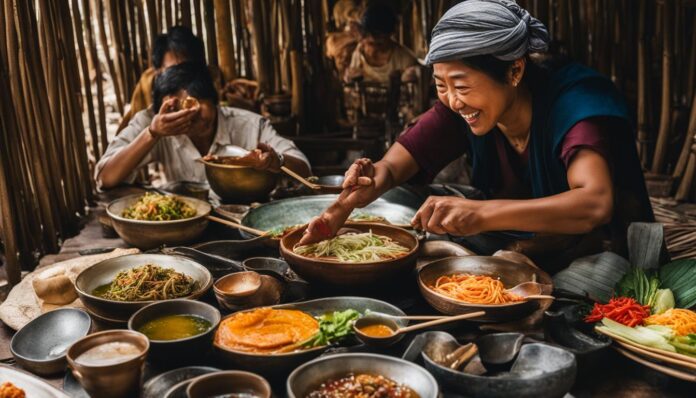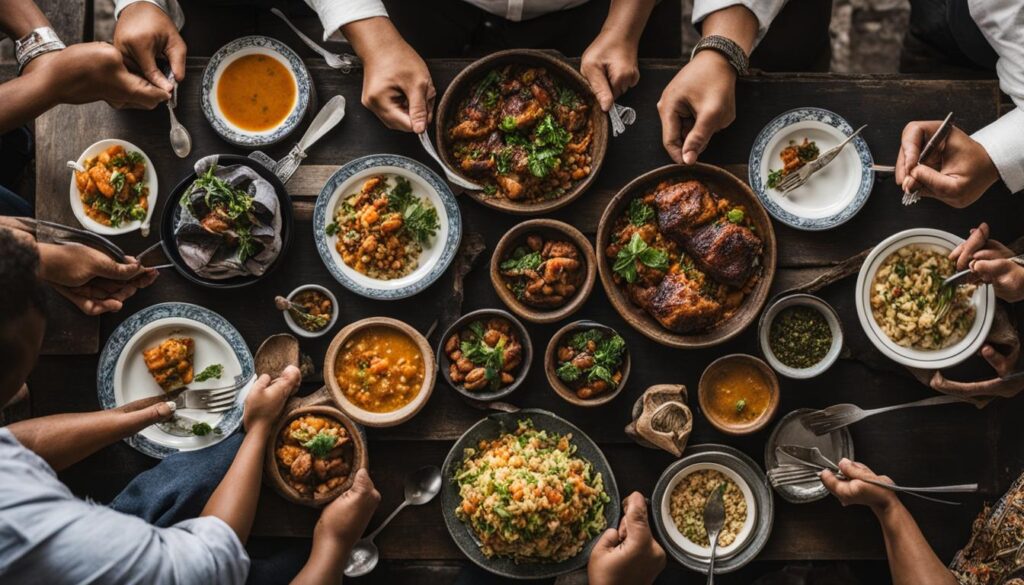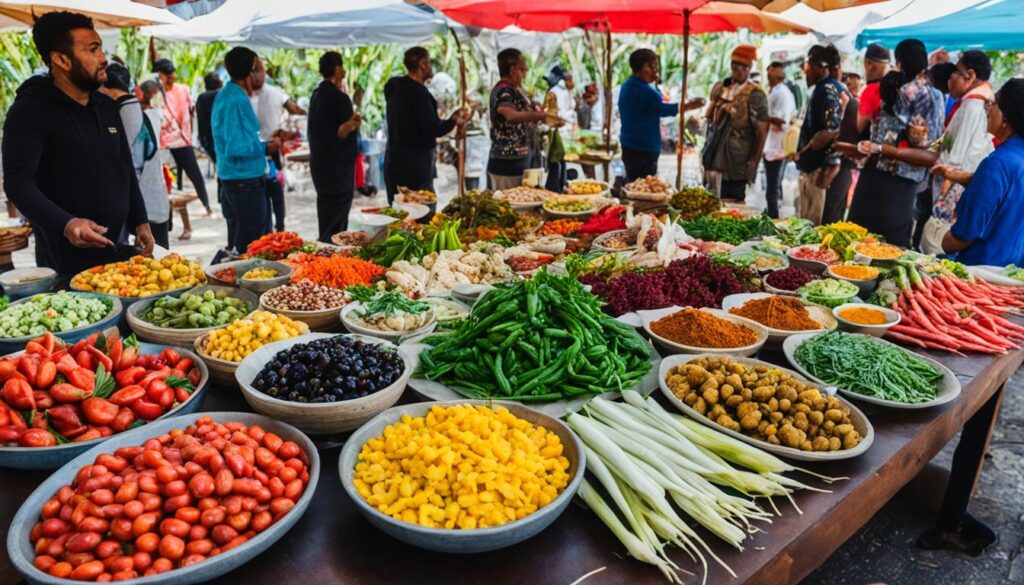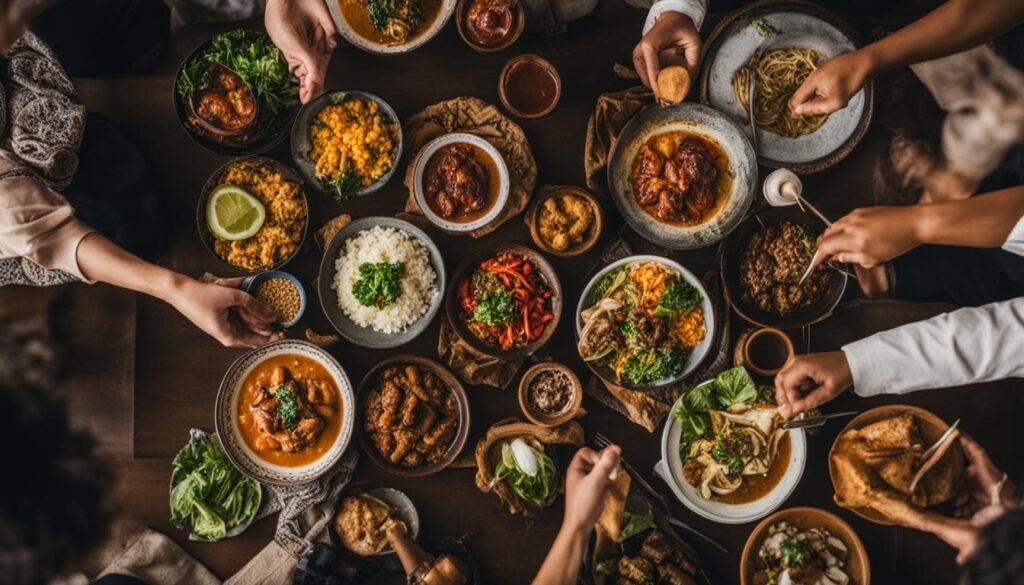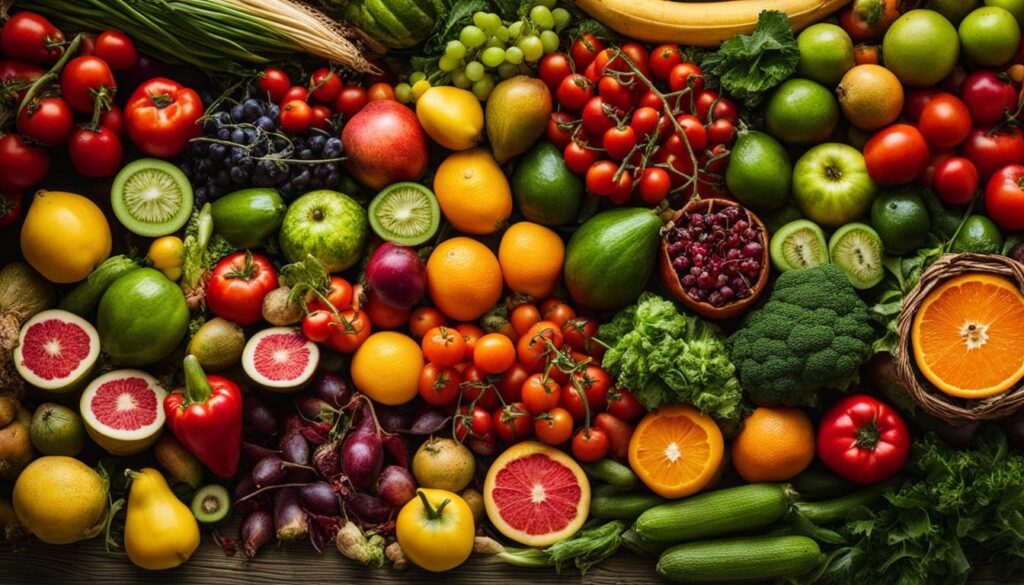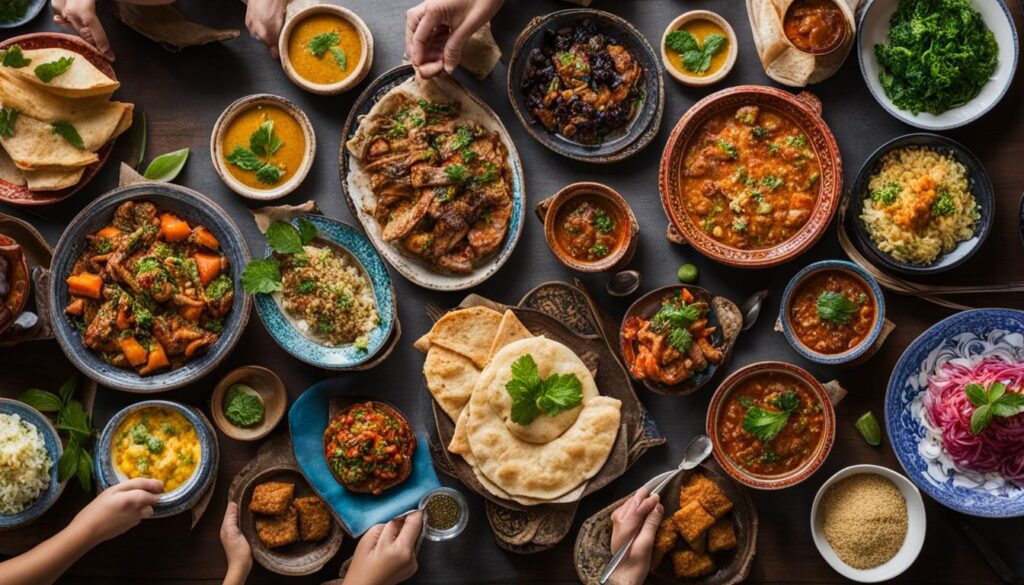Are you a food enthusiast who loves to explore new culinary traditions when traveling? Do you want to deepen your experience and understanding of cultural food traditions? Then, it’s essential to learn about respecting local food and dining customs. When you explore a new destination’s cuisine, you’ll want to do so with respect for the cultural norms. This includes understanding the significance of traditional food practices, adapting to local dining traditions and making informed menu choices that align with the region’s cultural dining customs.
By doing so, you’re not only gaining culinary exposure but showing appreciation for a community’s cultural heritage. Engaging with local food producers, participating in food-related festivals and events, and seeking guidance and recommendations from locals are some of the ways to honor and celebrate the local food culture. Practicing gratitude and appreciation is also crucial in fostering cross-cultural understanding and creating lasting memories.
Join us as we delve into the art of navigating local food customs with respect and explore how it can enrich your culinary experiences while honoring cultural food traditions.
Understanding Local Dining Etiquettes
When traveling, experiencing local cuisine can be an unforgettable adventure. However, it’s essential to remember that dining customs vary from culture to culture. Familiarizing yourself with local dining etiquette is crucial to show respect and appreciation for the local food culture.
Each region has its unique culinary customs and traditions. For example, in Japan, it’s customary to say “itadakimasu” before eating, which means “I receive this food.” On the other hand, in Mexico, it’s polite to keep your hands above the table during the meal.
Knowing basic table manners, such as using the correct utensils, is a great starting point. In many cultures, using chopsticks is the norm, while in others, a knife and fork are used. However, beyond basic etiquette, understanding local dining etiquettes can also help you avoid any faux pas that might otherwise offend your dining companions or host.
Local Dining Etiquettes Around the World
| Location | Dining Etiquettes |
|---|---|
| Japan | It is impolite to blow your nose or make loud noises while eating. Say “itadakimasu” before you start eating and “gochisousama deshita” when you finish. |
| Italy | Eat pasta with a fork and a spoon and keep your hands above the table. Avoid wasting food and taste authentic Italian cuisine, like spaghetti carbonara or margherita pizza. |
| India | Eat with your right hand, as the left hand is viewed as unclean. Use the left hand to hold the bread while tearing off pieces with the right hand. Try a popular Indian dish, like chicken tikka masala or chana masala. |
| France | Use the bread to scoop up remaining sauce from your plate, and don’t cut salad with a knife. Always hold the stem of a wine glass and sample traditional French cuisine, like the bouillabaisse or ratatouille. |
By taking the time to learn about local dining etiquettes, you can avoid unintentionally offending your hosts and show respect for the cultural food traditions. So, before you embark on your next culinary adventure, do your research and take note of the dining customs in the region you’re visiting.
Embracing Traditional Food Practices
When traveling to a new destination, it’s crucial to immerse yourself in the local food culture. Embracing traditional food practices is an excellent way to gain a deeper understanding of a community’s identity and contribute to its preservation. These practices have been passed down through generations, and they play an integral part in a culture’s identity.
Traditional food practices reflect a community’s values, beliefs, and customs. By experiencing these practices firsthand, you can connect with the local tradition and appreciate the significance of certain foods and ingredients. Additionally, practicing traditional culinary customs can help sustain the local economy and support small businesses that specialize in local cuisine.
| Significance of Traditional Food Practices | Examples of Traditional Food Practices |
|---|---|
| Shapes a community’s identity | Making homemade pasta in Italy |
| Reflects cultural values and beliefs | The importance of hospitality in Middle Eastern cultures |
| Preserves historical culinary techniques | Slow-cooking techniques in French cuisine |
By embracing traditional food practices, you can also enhance your culinary experiences. You’ll have the opportunity to taste unique flavors and ingredients that are specific to a particular region or culture.
Ultimately, respecting and embracing traditional food practices is an essential part of traveling and experiencing new cultures and should be included in your culinary adventures.
Making Informed Menu Choices
When traveling, tasting the local cuisine is a must. However, it’s important to approach local food customs with respect. By making informed menu choices, you can ensure that you’re taking part in traditional practices that are held dear in the region you’re visiting.
Start by examining the menu’s description and identifying local ingredients or cooking methods that may be unfamiliar. Don’t be afraid to ask your server about menu items or for recommendations.
| Tip: | Learn a few simple phrases in the local language to ask questions politely, such as “what do you recommend?” or “can you tell me more about this dish?” |
|---|
When choosing items, take note of portion sizes and balance your choices to experience a range of flavors. Consider sharing a few dishes with your travel companions for added variety.
Remember to respect local food customs by honoring serving styles and dining etiquette. For example, in some cultures, it’s customary to eat only with the right hand or to avoid touching food with your left hand. Observe the locals and follow their lead to avoid committing a cultural faux pas.
Understanding cultural dining customs is crucial to having an authentic and respectful culinary experience. By making informed menu choices that align with local food customs, you can show appreciation for the region’s traditions while enjoying delicious local cuisine.
Adapting to Dining Traditions
Each culture has its dining traditions that must be respected. When dining in a foreign country, it’s important to immerse yourself in their traditions, enhancing your culinary experience and displaying appreciation for the cultural heritage.
For instance, it’s customary in Japan to say “Itadakimasu” before starting a meal, which means ‘I humbly receive.’ Respectfully wait until everyone’s meal is served before starting to eat. Table manners differ around the world, so take time to understand the expectations.
Avoid committing any faux pas that could potentially be considered rude. Be open-minded and respect different dining rituals, tastes, and meal times. If you’re unsure of anything, ask politely to avoid any misunderstandings.
Dress Code
Some cultures require a specific dress code for meals. In some fancy restaurants, formal attire might be required. In more conservative cultures, such as the Middle East, it’s recommended to dress modestly, covering your arms and legs. Do some research on local customs before dining in a new destination.
Table Etiquette
Table etiquette varies from country to country. For example, in France, it’s a sign of appreciation to clean your plate, whereas in China, it’s polite to leave some food untouched to show that you have had enough. In India, it’s customary to eat with your right hand, while in Thailand, it’s considered rude to use a fork to push food onto a spoon.
“Food is a central activity of mankind and one of the single most significant trademarks of a culture.” – Mark Kurlansky
Culinary Customs
Culinary customs reflect a country’s history, geography, religion, and way of life. Different dishes and ingredients carry particular meanings. In Italy, fresh pasta and locally grown tomatoes are highly valued, whereas in Thailand, dishes are seasoned with lemongrass, coconut milk, and chili.
It’s essential to respect and appreciate the local culinary customs, be open-minded, and be willing to experience new and unfamiliar flavors.
Engaging with Local Food Producers
When exploring a new destination, make it a priority to engage with the local food producers and artisans. Not only does it support the local economy, but it also allows you to learn firsthand about the cultural significance of certain foods and ingredients. By respecting local food and dining customs, you can deepen your appreciation for the traditional culinary customs that have been passed down through generations.
Visiting local markets is an excellent way to meet farmers, fishermen, and other food producers and learn about their unique practices. You may also find specific ingredients that play an essential role in the local cuisine, adding an authentic touch to your culinary experiences.
Engaging with food producers can also provide you with an opportunity to give back to the community. By visiting and supporting local organizations that promote sustainable food production, you can help preserve the region’s culinary heritage while enjoying delicious meals that respect local food culture.
Examples of Engaging with Local Food Producers
| Destination | Local Food Producers | Engagement Options |
|---|---|---|
| Italy | Cheesemakers, Winemakers, Olive Oil Producers | Visit farms and vineyards, participate in guided tours, attend food festivals |
| Japan | Wasabi, Soy Sauce, Fish | Join a guided food tour, learn from local chefs, participate in cooking classes |
| Mexico | Mole Producers, Tortilla Makers, Mezcal Distillers | Visit markets and farms, attend cooking classes, participate in mezcal tastings |
Engaging with local food producers helps you to learn more about cultural food traditions, while also contributing to the sustainability and preservation of traditional culinary customs. By experiencing the local cuisine in this way, you’ll be sure to gain a deeper appreciation for the richness of a culture’s food culture.
Participating in Food-Related Festivals and Events
Attending food festivals and events is an exciting way to submerge into and celebrate local dining customs, and cultural food traditions, surrounding unique foods, techniques, and flavors. Such events provide a glimpse into the diverse heritage and culinary traditions of different regions and communities. By participating in these events, you get the chance to mingle with locals, connect with other food enthusiasts, and possibly pick up a new recipe or two.
Festivals and events are ideal for experiencing the best of both worlds, as they offer delicious food samples and cultural performances. Undoubtedly, the vibrant atmosphere and the aromas of exotic ingredients will leave you with unforgettable memories and an urge to explore more.
Highlights of Local Festivals and Events
| Event Name | Location | Date | Event Type |
|---|---|---|---|
| Soul Food Festival | New Orleans, Louisiana | June | Celebrates African-American Southern cuisine, music, and art |
| Hawaii Food and Wine Festival | Hawaii | October/November | Features Asian-Pacific Islander cuisine and world-renowned chefs |
| San Sebastian Gastronomika | San Sebastian, Spain | October | International culinary congress featuring workshops and tastings |
No matter where you travel to, there’s sure to be a food festival or event that showcases the region’s local dining customs and cultural food traditions.
“Food is our common ground, a universal experience.” – James Beard
Seeking Local Guidance and Recommendations
When traveling to a new destination, it’s essential to familiarize yourself with the local culinary customs and dining etiquette. However, it’s not always easy to navigate these unfamiliar territories on your own. That’s why seeking the guidance of locals or knowledgeable experts can be incredibly valuable.
Locals can provide valuable insights into the traditional food practices and cultural dining customs of the region. They can recommend local restaurants that offer an authentic culinary experience or suggest must-try dishes that align with the local food culture.
Alternatively, seeking guidance from experts, such as food bloggers or culinary tour guides, can also help you gain a deeper appreciation for the local dining traditions. These experts can offer insider tips on where to find the best local cuisine and guide you through the dos and don’ts of cultural dining customs.
No matter where you seek guidance, remember to ask respectful questions and show appreciation for the advice given. By seeking local guidance and recommendations, you can enhance your culinary experiences and foster meaningful connections with the local community.
Practicing Gratitude and Appreciation
As you navigate local cultural dining customs, showing gratitude and appreciation can go a long way in fostering cross-cultural understanding and building lasting memories. Whether you’re dining at a family-owned restaurant or sharing a meal with locals in their homes, taking the time to express your thanks for the experience can make all the difference.
Simple gestures of respect, like thanking your hosts and expressing admiration for the flavors and techniques used in preparing the meal, can demonstrate your appreciation for the local food culture. Not only will this show that you value the effort and tradition behind the cuisine, but it can also create meaningful connections with the community.
Remember to be curious, ask questions about the food and customs, and express genuine interest in learning about the culinary traditions. By practicing gratitude and appreciation, you can help make cultural dining experiences more rewarding and memorable.
“There is no sincerer love than the love of food.” – George Bernard Shaw
Conclusion
As you travel and explore new destinations, navigating local food and dining customs with respect is crucial. By understanding and embracing dining traditions and cultural customs, you can deepen your culinary experiences and make meaningful connections with the local community. Remember to seek local guidance and recommendations, make informed menu choices, and show gratitude and appreciation for the flavors and techniques you encounter. By honoring these traditional food practices, you can contribute to the preservation of a culture’s identity and make your travels even more enriching.




























